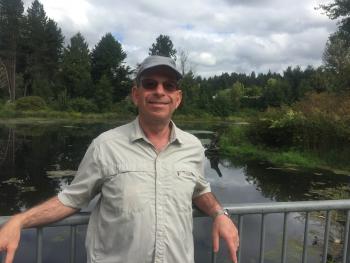Nir Barnea

NOAA Heritage Oral History Project
NOAA Heritage Oral History Project aims to document the history and legacy of NOAA through compelling interviews with its leaders. These firsthand accounts provide an invaluable resource that preserves NOAA's significant contributions to environmental research and management, fostering a deeper understanding of NOAA's vital role in shaping our understanding of the Earth's oceans and atmosphere.
Molly Graham
Nir Barnea was born in Israel in 1956. Nir’s father, Daniel Barnea, survived the Holocaust, while his grandparents were deported and killed in Auschwitz in 1945. Nir graduated in 1974 from Har Vagai High School in Upper Galilee, Israel, and served in the Israel Defense Forces until 1977. Nir immigrated to the United States and earned his BS in Microbiology from the University of Washington, in Seattle. He continued his graduate education at UW, earning a master’s degree in Environmental Health. Nir is also a Certified Industrial Hygienist. From 1992 until his retirement in 2020, Mr. Barnea worked for NOAA’s Office of Response and Restoration, serving as its health and safety coordinator, implementing in-situ burning of oil spills, and co-chairing the SMART development team. Additionally, he supported the cleanup of the Pribilof Islands in Alaska and has focused much of his work on marine debris.
Please Note: The oral histories in this collection are protected by copyright and have been created for educational, research and personal use as described by the Fair Use Doctrine in the U.S. Copyright law. Please reach out Voices@noaa.gov to let us know how these interviews are being used in your research, project, exhibit, etc. The Voices staff can help provide other useful resources related to your inquiry.
The NOAA mission is to understand and predict changes in climate, weather, oceans, and coasts, to share that knowledge and information with others, and to conserve and manage coastal and marine ecosystems and resources. The Voices Oral History Archives offers public access to a wide range of accounts, including historical materials that are products of their particular times, and may contain offensive language or negative stereotypes.
Voices Oral History Archives does not verify the accuracy of materials submitted to us. The opinions expressed in the interviews are those of the interviewee only. The interviews here have been made available to the public only after the interviewer has confirmed that they have obtained consent.
